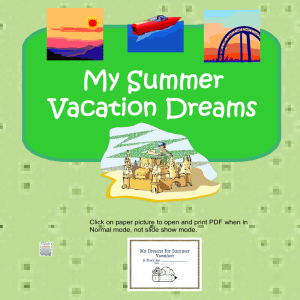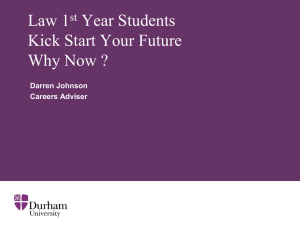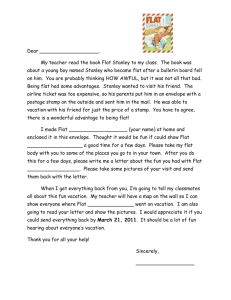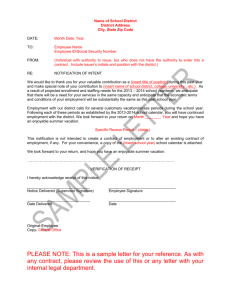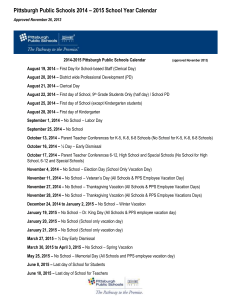vacation - Careers Centre
advertisement
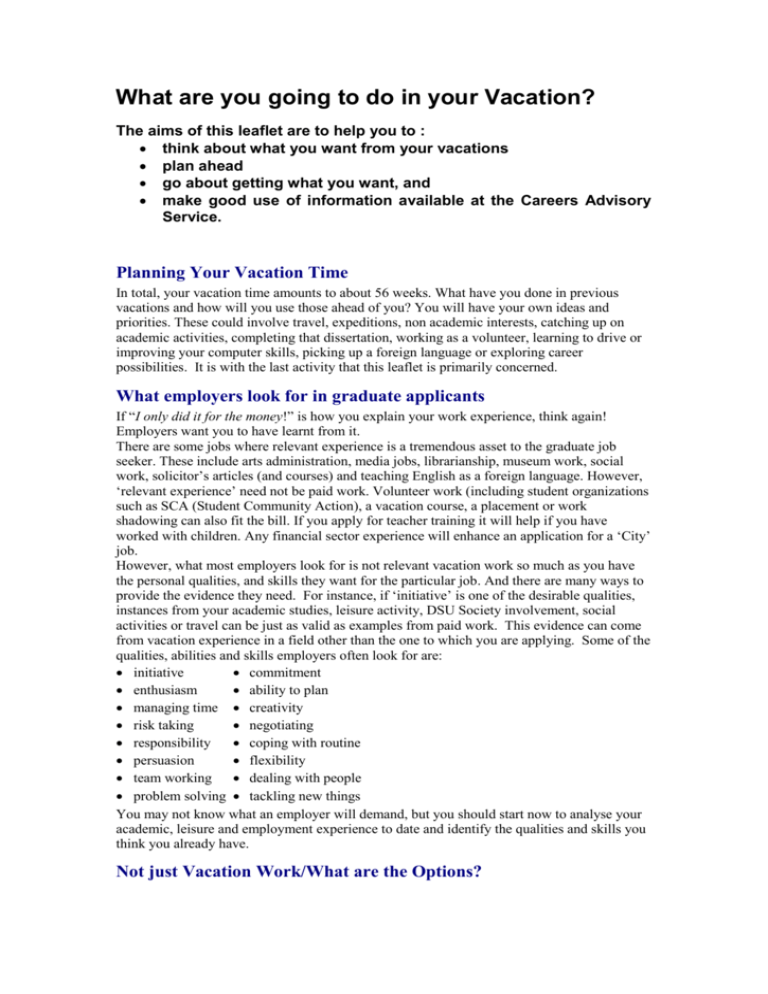
What are you going to do in your Vacation? The aims of this leaflet are to help you to : think about what you want from your vacations plan ahead go about getting what you want, and make good use of information available at the Careers Advisory Service. Planning Your Vacation Time In total, your vacation time amounts to about 56 weeks. What have you done in previous vacations and how will you use those ahead of you? You will have your own ideas and priorities. These could involve travel, expeditions, non academic interests, catching up on academic activities, completing that dissertation, working as a volunteer, learning to drive or improving your computer skills, picking up a foreign language or exploring career possibilities. It is with the last activity that this leaflet is primarily concerned. What employers look for in graduate applicants If “I only did it for the money!” is how you explain your work experience, think again! Employers want you to have learnt from it. There are some jobs where relevant experience is a tremendous asset to the graduate job seeker. These include arts administration, media jobs, librarianship, museum work, social work, solicitor’s articles (and courses) and teaching English as a foreign language. However, ‘relevant experience’ need not be paid work. Volunteer work (including student organizations such as SCA (Student Community Action), a vacation course, a placement or work shadowing can also fit the bill. If you apply for teacher training it will help if you have worked with children. Any financial sector experience will enhance an application for a ‘City’ job. However, what most employers look for is not relevant vacation work so much as you have the personal qualities, and skills they want for the particular job. And there are many ways to provide the evidence they need. For instance, if ‘initiative’ is one of the desirable qualities, instances from your academic studies, leisure activity, DSU Society involvement, social activities or travel can be just as valid as examples from paid work. This evidence can come from vacation experience in a field other than the one to which you are applying. Some of the qualities, abilities and skills employers often look for are: initiative commitment enthusiasm ability to plan managing time creativity risk taking negotiating responsibility coping with routine persuasion flexibility team working dealing with people problem solving tackling new things You may not know what an employer will demand, but you should start now to analyse your academic, leisure and employment experience to date and identify the qualities and skills you think you already have. Not just Vacation Work/What are the Options? All employers are impressed by applicants who have done their homework. But relevant vacation work is only one way of learning about a job and your own suitability. There are other ways of gaining an insight into (and testing your suitability for) careers which attract you. Vacation internships/projects Internships and vacation projects are probably better than most vacation jobs since the employer is likely to design a piece of real work, which will teach you about the organisation and the particular job function, and demand from you the qualities which make for success in permanent jobs in that function. Projects last between 4 and 10 weeks, and are usually well paid. Most employers who offer them see them as part of their overall graduate recruitment effort and a job offer, or at least a place at a final selection board, can follow. More than one company recruits all its graduate trainees this way. Vacation courses Residential short courses for final year students during the summer and Christmas vacations aim to provide a brief exploration of the type(s) of work for which they recruit graduates. If you are selected (and competition is usually keen) the employer will provide accommodation and meals and reimburse your travelling expenses. Like vacation project schemes, they aim to attract good graduate recruits. Students attending vacation courses may be able to by-pass initial job interviews. There are other vacation courses for which you will have to pay at least part of the cost such as the Careers Research and Advisory Centre (CRAC) courses on careers such as retailing. The Careers Advisory Service offers a 3-day Insight into Management course in Durham to over 80 students just before the start of their final year. Work shadowing or placements Typically these last for 1 or 2 weeks. Some are paid. The essence of work shadowing is to accompany a professionally qualified or senior person and discuss with them the context of their activities. These can include meetings with clients and colleagues, dealing with paper work and day to day work in a factory, shop or site. It aims to give you a better insight into the work you might do as a graduate recruit than you would be get in an unskilled vacation job in the same organisation. Volunteering Paid vacation work can be extremely hard to get in some areas such as museum work, broadcasting, journalism, publishing, arts administration, surveying, environmental conservation and archive work. Try to get paid employment but if you don’t succeed, volunteer your services for a few weeks. That’s long enough to get a feel for the work, opportunities and entry possibilities and will greatly enhance your subsequent recruitment prospects. In addition there are lots of organisations looking for willing pairs of hands, whether or not you have a career interest in that field, such as holidays for disabled people or deprived children or conservation schemes. Visits and use of contacts Try setting up an informal meeting with a practitioner in any field which interests you. Most people like talking about their jobs and are willing to share the fruits of their experience with an interested student. The Careers Advisory Service has names and addresses of local and national contacts who are keen to help students interested in the work they are doing. Details of these are on Careers Folders. In your home area, make contacts through family, friends or speculative approaches. See the leaflet - Networking. Applying for vacation work/How to Find It? Advertised opportunities Information and application forms for vacation work and courses sent in by employers are kept on the Vacation Work section. The vacancies themselves are advertised in our weekly vacation opportunities bulletin, also available for you to view on our web site at www.dur.ac.uk/careers-advice. The Job Shop, the Durham University student employment service, has details of local vacation work opportunities and is based in the Careers Advisory Service. More information at www.dur.ac.uk/DurhamJobshop. Applications (advertised vacancies) Apply in the format requested. Sometimes there will be an application form to complete and return. More often you will have to send a letter and CV. Help on compiling a CV and letters of application is available at the Careers Advisory Service. Speculative applications Most students get vacation work through speculative approaches to employers. The Careers Advisory Service also keeps up-to-date directories of vacation work opportunities and other useful information resources for addresses. Try all the possible approaches. Write. Phone. Knock on doors. Final message Apply in good time. January is not too soon to apply for summer vacation work and if at first you don’t succeed, persistence can pay dividends. If you get an initial non-committal reply and it is something you are keen to do, contact the employer again a few months later, stressing your enthusiasm. If the job is connected with your career interests, emphasise this fact. Good luck. Enjoy your vacation experiences. © Durham University Careers Advisory Service 2002
